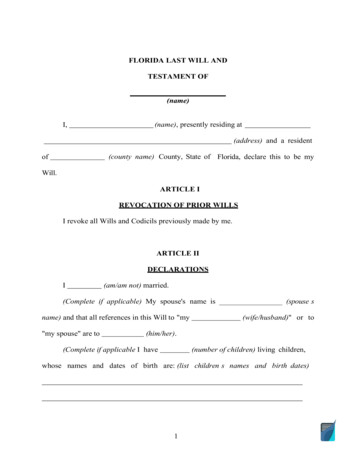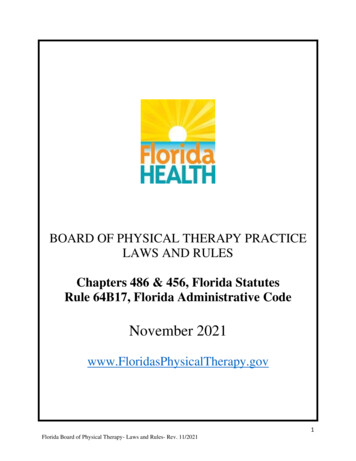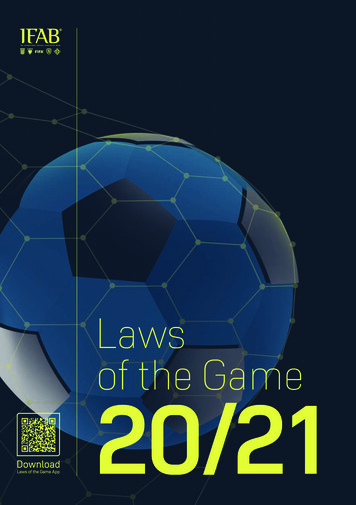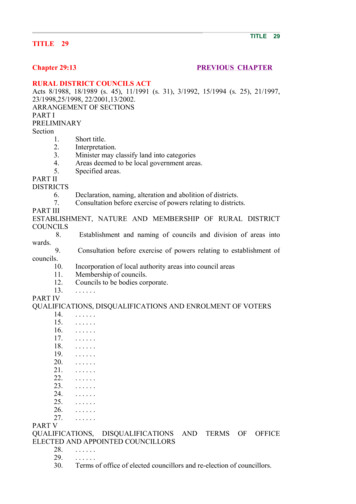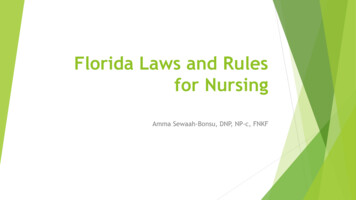
Transcription
Florida Laws and Rulesfor NursingAmma Sewaah-Bonsu, DNP, NP-c, FNKF
LEARNING OUTCOME AND OBJECTIVES:uDescribe the Florida Board of Nursing.uContrast the Florida Board of Nursing with nursing professional organizationsand the Florida Nurses Association.uDiscuss the levels of nursing practice in Florida.uDefine the factors for safe delegation to unlicensed assistive personnel.uExplain the requirements for renewing a nursing license in Florida.uDifferentiate between ethical and legal issues.uDiscuss Florida nursing law violations and disciplinary actions.
The Nurse Practice ActuAlthough the first hospital in NorthAmerica was established by theSpanish in St. Augustine in 1597and by the 1800s medical trainingin Florida and throughout theUnited States was still largelythrough apprenticeships.uFolk medicine, homeopathy, herbalmedicine, and midwiferypredominated.
The Nurse Practice ActuMidwives, mostly African Americanwomen, provided much of themedical care, particularlymaternity care, in impoverishedand isolated rural communitiesthroughout the South.
The Nurse Practice ActuIn England, Florence Nightingalehad only just succeeded inestablishing the first professionalnurse training school in the worldat St. Thomas’ Hospital in London,the first class starting on July 9,1860
Nurse Practice ActuThe hundreds of thousands ofcasualties during the U.S. Civil Warcreated a need for caregivers andtens of thousands of womenoffered their services, mostly on avolunteer basis.
Nurse Practice ActuIn 1861, responding to the strongopposition to female volunteers,Dorothea Dix organized a march onWashington demanding that womenbe allowed to treat Union soldiers.She was quickly put in charge ofnurses assigned to the U.S. Army.
Dragon Dix
Nurse Practice ActuAll NPAs include:uAuthority, power, and composition of a board of nursinguEducation program standardsuStandards and scope of nursing practiceuTypes of titles and licensesuRequirements for licensureuGrounds for disciplinary action, other violations, and possible remedies”
FLORIDA NURSING LAWS AND RULESFlorida Nurse Practice ActuIn Florida, nursing standards arecodified in the Florida Statutes(F.S.) and Florida AdministrativeCode (F.A.C.).uThe Florida Statues are apermanent collection of state lawsorganized by subject area into acode made up of titles, chapters,parts, and sections.uThe Florida Statutes are updatedannually by laws that create,amend, transfer, or repealstatutory material (FloridaLegislature, 2016a).
FLORIDA NURSING LAWS AND RULESuThe Florida Nurse Practice Act isoutlined in the Florida Statutes, TitleXXXII, Chapter 464, Regulation ofProfessions and Occupations (FloridaLegislature, 2016b).uThe sole legislative purpose of theNPA is to “ensure that every nursepracticing in this state meetsminimum requirements for safepractice.uIt is the legislative intent that nurseswho fall below minimum competencyor who otherwise present a danger tothe public shall be prohibited frompracticing in this state.”
Florida Board of NursinguHealth professions shall be regulated onlyfor the preservation of the health, safety,and welfare of the public under the policepowers of the state. Such professions shallbe regulated when:uTheir unregulated practice can harm orendanger the health, safety, and welfareof the public, and when the potential forsuch harm is recognizable and clearlyoutweighs any anticompetitive impactthat may result from regulation.uThe public is not effectively protected byother means, including, but not limitedto, other state statutes, local ordinances,or federal legislation.uLess restrictive means of regulation arenot available.The practice of nursing in Florida is licensedby the Florida Board of Nursing (BON), which isunder the jurisdiction of the FloridaDepartment of Health. The BON is funded andsupported by mandatory licensure fees paidby nurses wishing to practice legally in thestate of Florida.
Florida Board of Nursing: MembersuThe Florida Board of Nursing consists of 13 members. All members must be residents of thestate of Florida. The board must consist of:uSeven registered nurses who represent diverse fields and who have been engaged in thepractice of professional nursing for at least four years, including at least:uOne advanced registered nurse practitioneruOne nurse educator member of an approved programuOne nurse executiveuThree practical nurses who have practiced for at least four years prior to their appointmentuThree members who have never been licensed nurses and who are in no way connected withthe practice of nursinguThe members are appointed by the governor for terms of four years.
Florida Board of Nursing: RESPONSIBILITIESuThe NPA authorizes the Florida Board of Nursing to make and enforce rulesand regulations for registered nurses, practical nurses, certified nurseassistants, certified nurse-midwives, nurse practitioners, clinical nursespecialists, registered nurse first assistants, and certified registered nurseanesthetists (Florida Legislature, 2016b).uThe BON “licenses, monitors, disciplines, educates, and, when appropriate,rehabilitates its licensees to assure their fitness and competence in providinghealthcare services for the people of Florida” (FLBON, 2017). They areresponsible for enacting the rules outlined in the Florida Administrative Code.
Florida Nursing RulesuThe Florida Administrative Code is the official compilation of administrativerules for the state of Florida.uThe Department of State oversees the publishing of the F.A.C. and updates itweekly (FLDOS, 2010b).uChapter 64B9 of the F.A.C. outlines rules related to nursing.
Florida Center for NursingThe Florida Center for Nursing is distinctfrom the Board of Nursing and, as outlined inthe Nurse Practice Act, was formed to“address issues of supply and demand fornursing, including issues of recruitment,retention, and utilization of nurse workforceresources” (Florida Legislature, 2016b).The center has a separate board of directorsand is partly funded by fees imposed at thetime of licensure and licensure renewal.uThe Florida Center for Nursing is astate workforce center established inFlorida Statute (F.S. 464.0195) torecommend solutions to addressFlorida’s nursing shortage.uIt is here to inform, educate, andupdate you on nursing shortage issuesand solutions.uBy collecting, analyzing, and reportingon the nursing workforce, the Centerseeks to ensure an adequate supply ofdirect care providers for the health ofall Floridians.
PROFESSIONAL ORGANIZATIONSuOne of the hallmarks of a profession is that its members band together incollegial association to provide a variety of services for its members.uThese services include such things as continuing education, collectivebargaining, legislative advocacy, and information about the profession.uThese organizations are not set up by state laws or through the government.
PROFESSIONAL ORGANIZATIONSuOne of the hallmarks of aprofession is that its members bandtogether in collegial association toprovide a variety of services for itsmembers.uThese services include such thingsas continuing education, collectivebargaining, legislative advocacy,and information about theprofession.uThese organizations are not set upby state laws or through thegovernment.
Florida Board of Nursing vs. PROFESSIONALORGANIZATIONSuThe mission of professionalassociations is characterized bythat of the Florida NursesAssociation:u“To serve and support allregistered nurses throughprofessional development,advocacy, and the promotion ofexcellence at every level ofprofessional nursing practice”uThe primary difference betweenthe Florida Board of Nursing andprofessional organizations is thatprofessional organizations:uHave no legal authority, whereasthe Florida Board of Nursing hasauthority because it wasestablished by the Nurse PracticeAct with the unambiguous functionof promoting and protecting thehealth of citizens through safenursing practice.
LEVELS OF NURSING PRACTICE IN FLORIDAuThe practice of nursing is regulated by the state in order to protect membersof the public who need nursing care.uSafe, competent nursing practice is grounded in the law as written in thestate’s Nurse Practice Act and its rules. Because nursing is a dynamic practice,questions may arise about whether certain tasks are within the nurse’s scopeof practice.uAll nursing care should be consistent with the nurse’s preparation, education,experience, knowledge, demonstrated competency, and the laws and rulesgoverning nursing.
uA licensed practical nurse (LPN) meansPracticalNursingany person licensed in Florida to practicepractical nursing.The practice of practical nursing is theperformance of selected acts,including the administration of treatmentsand medications in the care of the ill,injured, or infirm and the promotion ofwellness, maintenance of health, andprevention of illness of others.uPractical nursing must beperformed under thedirection of a registerednurse, a licensedphysician, a licensedosteopathic physician, alicensed podiatricphysician, or a licenseddentist.A practical nurse isresponsible andaccountable for makingdecisions that are basedon his or her educationalpreparation andexperience in nursing
uThe purpose of the administrative code rule related toadministration of intravenous therapy by LPNs is toprotect the public by ensuring the availability ofintravenous therapy and its competent administration inthe care of the ill, injured, or the infirm.Aspects of intravenous therapy whichare outside the scope of practice of thelicensed practical nurse unless under thedirect supervision of the registeredprofessional nurse or appropriatephysician and which shall not beperformed or initiated by licensedpractical nurses without directsupervision include the following:uInitiation of blood and blood productsuThe administration of intravenous therapy is thetherapeutic infusion and/or injection of substancesthrough the venous peripheral system, consisting ofactivity which includes:Initiation or administration of cancerchemotherapyuInitiation of plasma expandersuInitiation or administration ofinvestigational drugsuMixing intravenous solutionuIV pushes, except heparin flushes andsaline flushesIV THERAPYobserving, initiating, monitoring, discontinuing,maintaining, regulating, adjusting, documenting,planning, intervening, and evaluating.
“UNDER THE DIRECTION” VERSUS “UNDER DIRECTSUPERVISION”uIt is important to note that “under the direction of a registered professionalnurse” means that the registered professional nurse has delegatedintravenous therapy functions to a qualified licensed practical nurse.uThe registered professional nurse does not in all instances have to be on thepremises in order for the licensed practical nurse to perform the delegatedfunctions.uThis must be distinguished from “direct supervision,” which means on thepremises and immediately physically available.
SUPERVISION IN NURSING HOME FACILITIESLicensed practical nurses may supervise certified nursing assistants (CNAs)and unlicensed personnel in nursing home facilities pursuant to F.A.C. 64B9-16.The LPN, however, must complete a minimum 30-hour, post-basic supervisoryeducation course (or a supervisory course at a post-graduate level) anddemonstrate a work history of no less than six months of full-time clinicalnursing experience in a hospital or nursing home.A registered nurse must provide supervision to the LPN.
uThe observation, assessment, nursingdiagnosis, planning, intervention, andevaluation of care; health teachingand counseling of the ill, injured, orinfirm; and the promotion of wellness,maintenance of health, andprevention of illness of othersuThe administration of medications andtreatments as prescribed orauthorized by a duly licensedpractitioner authorized by the laws ofthis state to prescribe suchmedications and treatmentsuThe supervision and teaching of otherpersonnel in the theory andperformance of any of the actsdescribed in this subsectionProfessional NursingA registered nurse (RN) means any personlicensed in Florida to practice professionalnursing. The practice of professional nursingmeans the performance of those acts requiringsubstantial specialized knowledge judgment,and nursing skill based upon applied principlesof psychological, biological, physical, and socialsciences which shall include, but not be limitedto :
Nursing Diagnosis and TreatmentuA nursing diagnosis is defined asthe observation and evaluation ofphysical or mental conditions,behaviors, signs and symptoms ofillness, and reactions to treatment,and the determination as towhether such conditions, signs,symptoms, and reactions representa deviation from normal.uNursing diagnosis is in the scope ofpractice of the registered nurseand defines his/her role.uA nursing treatment is theestablishment and implementationof a nursing regimen for the careand comfort of individuals, theprevention of illness, and theeducation, restoration, andmaintenance of health.
Specialty Certification:ADVANCED REGISTERED NURSEPRACTITIONERuNow known as Advanced Practice Registered Nurse (APRN)umeans any person licensed in Florida to practice professional nursing and certifiedin advanced or specialized nursing practice, including certified registered nurseanesthetists, certified nurse midwives, and nurse practitioners.uThe advanced registered nurse practitioner may also perform acts of medicaldiagnosis and treatment, prescription, and operation defined by the Board ofNursing and his/her specialty.uAPRN include certified registered nurse anesthetists, certified nurse midwives, andnurse practitioners. Within the established framework, an advanced registerednurse practitioner may:uMonitor and alter drug therapiesuInitiate appropriate therapies for certain conditionsuOrder diagnostic tests and physical and occupational therapy
Specialty Certification: CertifiedRegistered Nurse AnesthetistuThe certified registered nurse anesthetist (CRNA) may, to the extent authorized byestablished protocol approved by the medical staff of the facility in which theanesthetic service is performed, perform any or all of the following:uDetermine the health status of the patient as it relates to the risk factors and to theanesthetic management of the patient through the performance of the general functionsuBased on history, physical assessment, and supplemental laboratory results, determine,with the consent of the responsible physician, the appropriate type of anesthesia withinthe framework of the protocoluOrder under the protocol preanesthetic medicationuPerform under the protocol procedures commonly used to render the patient insensibleto pain during the performance of surgical, obstetrical, therapeutic, or diagnosticclinical procedures, which include ordering and administering regional, spinal, andgeneral anesthesia; inhalation agents and techniques; intravenous agents andtechniques; and techniques of hypnosis
Specialty Certification: Certified NurseMidwifeuThe certified nurse midwife may, to the extent authorized by an established protocol which hasbeen approved by the medical staff of the healthcare facility in which the midwifery servicesare performed, or approved by the nurse midwife’s physician backup when the delivery isperformed in a patient’s home, perform any or all of the following:uPerform superficial minor surgical proceduresuManage the patient during labor and delivery, to include amniotomy, episiotomy, and repairuOrder, initiate, and perform appropriate anesthetic proceduresuPerform postpartum examinationuOrder appropriate medicationsuProvide family planning services and well-woman careuManage the medical care of the normal obstetrical patient and the initial care of a newborn patient
Nurse PractitioneruThe nurse practitioner may perform any or all of the following acts within theframework of established protocol:uManage selected medical problemsuOrder physical and occupational therapyuInitiate, monitor, or alter therapies for certain uncomplicated acute illnessesuMonitor and manage patients with stable chronic diseasesuEstablish behavioral problems and diagnosis and make treatment recommendations
Specialty Certification:CLINICAL NURSE SPECIALISTclinical nurse specialist (CNS) means any person licensed in Florida to practice professional nursing and certified in nursespecialist practice.Clinical nurse specialist practice is the delivery and management of advanced practice nursing care to individuals or groups, includingthe ability to: Assess the health status of individuals and families using methods appropriate to the population and area of practiceA Diagnose human responses to actual or potential health problems Plan for health promotion, disease prevention, and therapeutic intervention in collaboration with the patient or client Implement therapeutic interventions based on the nurse specialist’s area of expertise and within the scope of advanced nursingpractice, including, but not limited to, direct nursing care, counseling, teaching, and collaboration with other licensed healthcareproviders Coordinate healthcare as necessary and appropriate and evaluate with the patient or client the effectiveness of care
CERTIFIED REGISTERED NURSE FIRSTASSISTANTuFlorida Statutes encourage the use of RN first assistants who meet thequalifications as “assistants at surgery” by physicians and hospitals to providequality, cost-effective surgical intervention to healthcare recipients in the state.uRegistered nurse first assistants meet the qualifications listed in F.S.464.027 (Florida Legislature, 2016b):uRN licensureuCertification in perioperative nursinguCertificate from, and successful completion of, a recognized program (arecognized program addresses all content of the Association of periOperativeRegistered Nurses’ Core Curriculum for the Registered Nurse First Assistant, andincludes one academic year, defined as 45 hours of didactic instruction and 120hours of clinical internship or its equivalent of two college semesters)
Practice of Certified Nursing Assistantscertified nursing assistant (CNA) means a person who meets the qualifications specified in the Florida Statutes andwho is certified by the BON as a certified nursing assistant. The practice of a certified nursing assistant means providingcare and assisting persons with tasks relating to the activities of daily living. Such tasks are those associated with:A Personal care Maintaining mobility Nutrition and hydration Toileting and elimination Assistive devices Safety and cleanliness Data gathering Reporting abnormal signs and symptoms Postmortem care Patient socialization and reality orientation End-of-life care Cardiopulmonary resuscitation and emergency care Residents’ or patients’ rights Documentation of nursing-assistant services
DELEGATION TO UNLICENSED ASSISTIVEPERSONNELuRegistered nurses and LPNs must follow the rules from the FloridaAdministrative Code when delegating tasks to unlicensed assistive personnel(UAPs).uUAPs are persons who do not hold licensure from the Division of HealthQuality Assurance of the Department of Health but who have been assigned tofunction in an assistive role to registered nurses or licensed practical nurses inthe provision of patient-care services.uExamples of UAPs are CNAs, home health aides, patient care technicians,surgical assistants, and patient care assistants.
DELEGATION TO UNLICENSED ASSISTIVEPERSONNELuWhen the RN or LPN is delegating, he or she must use nursing judgment toconsider the suitability of the task or activity to be delegated. Factors toweigh in selecting the task or activity include:uPotential for patient harmuComplexity of the taskuPredictability or unpredictability of outcome, including the reasonable potential fora rapid change in the medical status of the patientuLevel of interaction required or communication available with the patientuResources both in equipment and personnel available in the patient setting
Delegation of Tasks ProhibiteduuThe registered nurse or licensed practical nurse, under direction of theappropriate licensed professional as defined in F.S. 464.003(3)(b), shall notdelegate:uThose activities not within the delegating or supervising nurse’s scope of practiceuNursing activities that include the use of the nursing process and require the specialknowledge, nursing judgment, or skills of a registered or practical nurse, including:uThe initial nursing assessment or any subsequent assessmentsuThe determination of the nursing diagnosis or interpretations of nursing assessmentsuEstablishment of the nursing care goals and development of the plan of careuEvaluation of progress in relationship to the plan of careThose activities for which the UAP has not demonstrated competence
ETHICS VERSUS LAWSuNurses practice within a society governedby laws. Nurses also follow ethicalstandards of care at all times. Thus, nursesneed to understand the basis of law(jurisprudence) in the United States andthe relationship of law to ethics in thepractice of nursing.uEthical principles serve as generalguides for behavior.uIn contrast, laws flow from ethicalprinciples and consist of rules aboutspecific situations.uThese rules are enforced by anauthority with the power to see thatthey are obeyed.
NURSING ETHICAL PERSPECTIVE: VIRTUEETHICSuNursing is defined as “the protection, promotion, and optimization of healthand abilities; prevention of illness and injury; facilitation of healing;alleviation of suffering through the diagnosis and treatment of humanresponse; and advocacy in the care of individuals, family, groups,communities, and populations” (ANA, 2015c, p. 1).uThe virtue of caring is prominent in this definition.uVirtue-based ethics is particularly suited to nursing practice, as it emphasizesa nurse’s obligations to the patient and the principles on which nursingpractice are based (ANA, 2015b).uVirtue ethics emphasizes a person’s character rather than rules orconsequences in determining right action.
THREE MAJOR ETHICAL APPROACHESuDeontological. Actions are guided by what a person ought to do rather thanby what the outcome will be. Duty determines what is morally right.uTeleological. Also called consequentialism. A behavior is morally rightdepending on the outcome, or consequences, of that action.uVirtue ethics. A values-based approach that emphasizes the application ofcharacter traits as the basis for moral action. Rightness of action is based onimplementation of key virtues such as honesty or benevolence.
CODE OF ETHICS FOR NURSESuCodes of ethics are formal statements that set forth standards of ethicalbehavior for members of a group.uIn fact, one of the hallmarks of a profession is that its members subscribe toa code of ethics. Every member of a profession is expected to read,understand, and abide by the ethical standards of its occupation.
PROVISIONS OF THE CODE OF ETHICS FORNURSESuProvision 1. The nurse practices with compassion and respect for the inherent dignity, worth, and unique attributes of everyperson.uProvision 2. The nurse’s primary commitment is to the patient, whether an individual, family, group, community, orpopulation.uProvision 3. The nurse promotes, advocates for, and protects the rights, health, and safety of the patient.uProvision 4. The nurse has authority, accountability, and responsibility for nursing practice; makes decisions; and takes actionconsistent with the obligation to promote health and to provide optimal care.uProvision 5. The nurse owes the same duties to self as to others, including the responsibility to promote health and safety,preserve wholeness of character and integrity, maintain competence, and continue personal and professional growth.uProvision 6. The nurse, through individual and collective effort, establishes, maintains, and improves the ethical environmentof the work setting and conditions of employment that are conducive to safe, quality health care.uProvision 7. The nurse, in all roles and settings, advances the profession through research and scholarly inquiry, professionalstandards development, and the generation of both nursing and health policy.uProvision 8. The nurse collaborates with other health professionals and the public to protect human rights, promote healthdiplomacy, and reduce health disparities.uProvision 9. The profession of nursing, collectively through its professional organizations, must articulate nursing values,maintain the integrity of the profession, and integrate principles of social justice into nursing and health policy.
NURSING ETHICAL PRINCIPLESuEthical principles are fundamental concepts by which people make decisions.Five ethical principles mark the practice of professional nursing and areinherent in the Code of Ethics for Nurses:uAltruismuAutonomyuHuman dignityuIntegrityuSocial justice
ETHICAL DILEMMASuEthical dilemmas in healthcarefacilities frequently arise whenmodern medicine keeps hearts andlungs functioning much longer thanthinking brains.uTo help resolve these perplexingissues, many institutions appointethics committees made up ofhealthcare professionals, ethicists,lawyers, and clergy.uThe task of ethics committees is tohelp decision makers resolve ethicaldilemmas.uEthical decision-making process:uGather relevant facts about thepatient’s age, diagnosis, advancedhealthcare directive, and applicablelaws.uIdentify and clearly state proposedactions together with the ethicalprinciples represented by eachproposed action.uDetermine who can make thedecision and assist the person orpersons to make it.uProvide emotional support foreveryone involved in resolving thedilemma.
Laws and RulesuLaws flow from ethical principles and are limited to specific situations andcodified by detailed language. Laws establish rules of conduct and areformulated by an authority with power to enforce them. As such, laws changewith time and circumstances.uThe state of Florida has the power to create and enforce laws governing theprofession of nursing, including licensure. In the states, the division of powermirrors that of the federal government:uThe legislative branch makes laws on behalf of the people.uThe judicial branch interprets these laws and adjudicates disputes, fulfilling itspurpose to administer justice without partiality.uThe executive branch administers and enforces the laws, using the police power ofthe state.
Laws and RulesSOURCES OF LAWTypeStatutoryAdministrativeSourceLaws passed by legislativebodies of federal, state, andlocal governmentsExecutive powers, delegated bythe legislative branchFunctionsProtects and provides for thegeneral welfare of societyCarries out special duties ofvarious agenciesExampleThe Florida legislature passedthe Nurse Practice Act, which isoutlined in the Florida Statutes,Title XXXII, Chapter 464,Regulation of Professions andOccupationsThe Florida Department ofState maintains statewide rulesfor nurses, which are outlinedin the Florida AdministrativeCode, Division 64B9, Board ofNursing
DISCIPLINE RELATED TO NURSING PRACTICEuThe Florida Board of Nursingprotects the public’s health andwelfare by overseeing and ensuringthe safe practice of nursing.uIt regulates and oversees nursingpractice by enforcing the nursinglaws of Florida. Violations of theFlorida law related to nursing(F.A.C. 64B9 and fF.S. 456 and 464)are serious and may result incomplaints being filed and indiscipline by the Board ofNursing .uThe BON utilizes its authority todecide whether misconduct orunsafe practice has occurred andwhat action should be taken.Violations are taken very seriouslysince they can put patients at risk.uThis is why every nurse isresponsible for understanding his/her scope of practice and otherrequirements outlined in the law.
CitationsuViolations of Florida law that may result in citations include, but are not limited to:uFalse, deceptive, or misleading advertisinguImproper use of a nursing titleuUnprofessional conduct (see below)uIssuance of a worthless bank check to the Department or to the BoarduFailure to report address changeuFailure to pay a Board-ordered administrative fine by the time ordereduFailure to complete a Board-ordered continuing education course by the time ordereduFailure when requested to document full compliance with the continuing educationrequirementsuFailure to submit updates of required information in practitioner profile within 15 days afterthe final activity that renders such information a factuProviding to another individual a confidential password, access code, keys, or other entrymechanisms, which results in a violation of, or threatens, the integrity of a medicationadministration system or an information technology systemuCitations result in monetary penalties as outline in F.A.C. 64B9-8.
UNPROFESSIONAL CONDUCTuUnprofessional conduct shall include:uInaccurate recordinguMisappropriating drugs, supplies, or equipmentuLeaving a nursing assignment without advising licensed nursing personneluStealing from a patientuViolating the integrity of a medication administration system or an information technology systemuFalsifying or altering of patient records or nursing progress records, employment applications, or time recordsuViolating the confidentiality of information or knowledge concerning a patientuDiscriminating on the basis of race, creed, religion, sex, age, or national origin in the rendering of nursing services asit relates to human rights and dignity of the individualsuEngaging in fraud, misrepresentation, or deceit in taking the licensing examinationuImpersonating another licensed practitioner or permitting another person to use his certificate for the purpose ofpracticing nursinguProviding false or incorrect information to the employer regarding the status of the licenseuPracticing beyond the scope of the licensee’s license, educational preparation, or nursing experienceuUsing force against a patient,
Florida Nurse Practice Act u In Florida, nursing standards are codified in the Florida Statutes (F.S.) and Florida Administrative Code (F.A.C.). u The Florida Statues are a permanent collection of state laws organized by subject area into a code made up of titles, chapters, parts, and sections. u The Florida Statutes are updated

